The key to realizing a dream is to focus not on success but significance, and then even the small steps and little victories along your path will take on greater meaning.
– Oprah Winfrey
Weekly Objectives
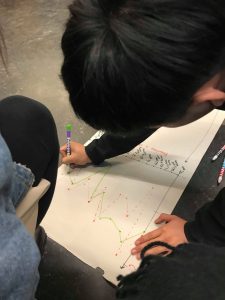
- Compile and analyze all of our data collected
- Develop a customer loyalty program based on our data collected
- Begin drafting our project report, our project presentation, and our infographic
- Consult with Tara and discuss the loyalty programs based on our data to help increase and retain the customer base
Achievements
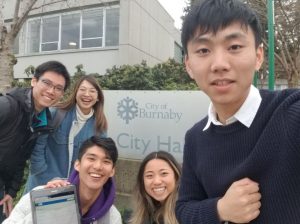
- Gained consent from respective authorities to survey in desired locations
- Overcame a great degree of uncertainty between our initial version of the survey and its alignment with Tara’s goals. We resolved our conflicts by collectively compiling our opinions and editing our questions accordingly.
- The survey was not distributed according to our schedule due to the delayed feedback from our community partner regarding our survey questions. There are times when we may feel that our project is “defined and characterized by conditions of inherent and unavoidable uncertainty” (Shulman, 2005, p. 18). Thus, it is important for our group to stay composed and adapt as challenges like these are valuable lessons in improving our skills. In this situation, we met with Tara in person and we were able to review and finalize our survey questions on March 5.
- Went to the desired locations to conduct our survey using Qualtrics and took pictures between March 5 and March 10
- Edited some of our questions that encountered complications with some participants during our surveying
- Collected survey data of how individuals in Burnaby engage with the Farmer’s market
- Gained new experiences, skills and knowledge regarding communication and survey taking
Moment of Significance

The LFS 350 Moment of Significant Change workshop helped our team identify where all of us stand regarding our happiness, skill and knowledge gained or lost from this class in an illustrative fashion. Among the peaks and the dips, we noticed a common trend of decreasing happiness after our first community partner meeting with the Artisans Farmers Market Society (AFMS).
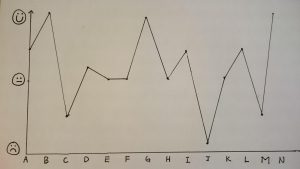
Upon this discovery, we took the initiative to collectively address why this negative trend exists and spoke about our own individual factors contributing to the decline. We learned that the primary reason of concern is the uncertainty of how to proceed with the project by meeting the community partner’s wishes while taking on the simultaneous incorporation of classroom-based concepts of asset-based community development. The approach delves on the principle “that a recognition of strengths and assets is more likely to inspire positive action for change in a community” (Mathie & Cunningham, 2003, p. 477). The community members are the center of development and any progression for our project should arise from this source. However, our group learned that many of the AFMS marketing attempts were unsuccessful in previous years. We were unsure unsure how our team could improve upon previous strategies that were creative and had high potential to attract customers. This moment of significance motivated us to work cohesively to curate a tactful intervention for the AFMS. As Tim Harford suggests, it is important to embrace potential setbacks and adapt from them (2015).
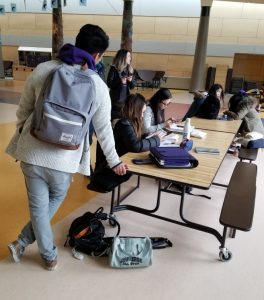
Subsequently, we designed a comprehensive set of surveying questions that would encompass both food security concepts and assess consumer interest in the AFMS. We then met up with Tara, our community partner, once more to review our survey. This helped us articulate and refine the questions. Moreover, the condensed survey had a stronger focus on our research question and better addressed the population of interest. This moment of significance helped us not only build stronger team dynamic, but also fostered a stronger working relationship with Tara. This demonstrates the importance of capacity building, which values the long term benefits of continuous learning growth within the group and favors the growth of our community partner’s confidence and ability to make effective decisions in future projects (University of Memphis, 2017). We hope that as an outcome, the AFMS will gain stronger insight of their customers and how to best cater to their interests, and that as a group we have learned more about working alongside community stakeholders. Furthermore, we learned how to better utilize communication skills among group members to discuss our concerns and how to openly accept criticism for our ideas. As a result, our happiness and skill levels increased. After surveying, our knowledge increased as well after speaking with community members about their perceptions of farmers markets and from assessing local food security levels.
Describe your groups strategy for successful project completion (the Graceful Dismount).
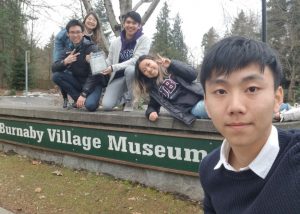
As the term is coming to an end, our group all mutually agree that it is important that we ensure everyone is still on the same page. Looking back, the process of completing our survey and getting feedback from Tara was indeed a hurdle that had put a lot of stress in our group. As a result, as our project is coming to an end, we have decided to conduct an internal anonymous feedback survey so that we can identify our areas of strength and areas that require improvement. Our reason behind this survey is to create a sense of awareness of what our group’s thoughts were so far and to establish areas that may need more consideration. The results of the survey allow us to enhance our strengths and to bring about a mindful mentality for the last couple of weeks of our journey.
Since now we have all our data collected, for the upcoming weeks, we will be organizing the data into categories based on each location that we visited. To accomplish this, we will be assigning a location to each team member to increase efficiency. Katheryn will be our info-graphics designer, while Adrian and Albert will be responsible for analyzing the data. Lily and William will be responsible for writing our results. Finally, we will all work together to write up, edit and finalize our report.
Lastly, we strongly believe that a mindset shift to “capacity building” is essential if we are to achieve a “sustained” and meaningful change within the food system (Memphis, 2017). Rather than solely focusing on the immediate problem of our project, we will also be giving attention to building everyone’s confidence, knowledge, and skills for further development regarding our professional goals in life. Therefore, our graceful dismount that will lead us to successful project completion will consist of capacity building and delegated roles to achieve efficiency.
Table 1: Group Internal Anonymous Feedback: Areas of Strength and Areas that Require Improvement
| Strengths | Needs Improvement |
| Dependability – We were able to rely on each other to get assigned tasks finished | Staying on track – not losing focus every so often on task at hand |
| Adaptability- We were able to switch between different roles when needed | Preparedness – did not put enough effort into thinking about what specific concerns or questions we had for Tara |
| Teamwork – Everyone was understanding and willing to help others when needed | Avoiding multitasking so that we can accomplish one task to it’s best ability (e.g. focus on making the survey more valid and relevant rather than simultaneously focusing on the appearance. |
| Fluent, responsive, and effective communication within the team to ensure that everyone knew what they were suppose to do |
References
“How Messy Problems Can Inspire Creativity. TED, Tim Harford, London, 2015.” YouTube, YouTube, 17 Jan. 2016, www.youtube.com/watch?v=Jd_j_kw_jZQ.
Mathie, A., & Cunningham, G. (2003). From clients to citizens: Asset-based community development as a strategy for community-driven development. Development in Practice, 13(5), 474-486. 10.1080/0961452032000125857
Shulman, L. S. (2005). Pedagogies of uncertainty. Liberal Education, 91(2), 18–25. Retrieved from http://files.eric.ed.gov/fulltext/EJ697350.pdf
The University of Memphis, (2017). Benefits of Capacity Building. Retrieved from http://www.memphis.edu/ess/module5/page7.php